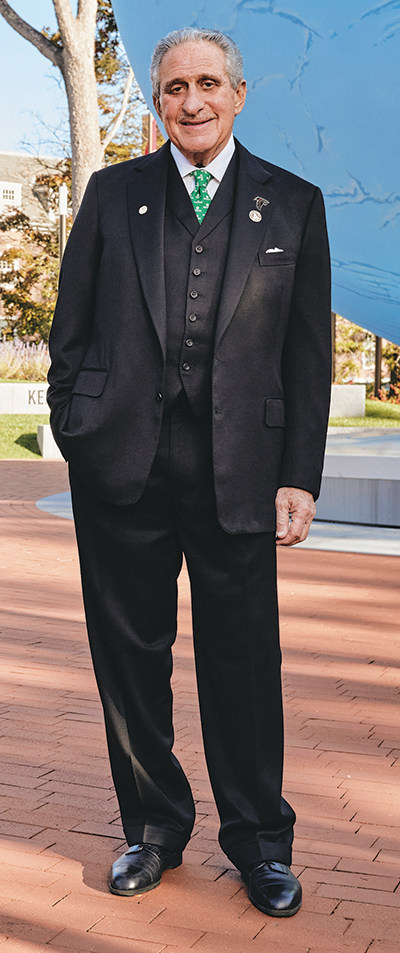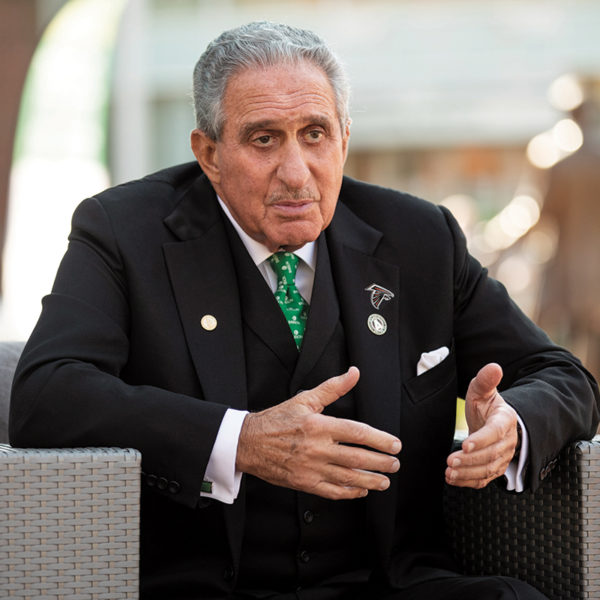The Blank Blueprint for the Future of Entrepreneurial Leadership

With his core values as the cornerstone, Arthur M. Blank ’63, H’98 and Babson College—thanks to a game-changing $50 million gift—are laying the groundwork to inspire and shape the next generation of entrepreneurial leaders.
It’s a picture-perfect autumn morning on the Babson College campus, and Arthur M. Blank ’63, H’98, is strolling down memory lane.
Decked out in a green Babson tie and matching face mask, he arrives at the statue of the school’s founder and recounts how he once met Roger Babson at a Founder’s Day event. He notices Park Manor Central and suggests visiting the old dorm he once called home six decades ago and where he once ran both a landscaping business and a laundry service.
But, that’s not why Blank—the legendary co-founder of The Home Depot, owner of the Atlanta Falcons, and celebrated philanthropist—is back on campus on this mid-October day. The 78-year-old entrepreneur is here to support the College’s expanding focus on values-driven leadership and to expound upon the six core values he writes about in his new best-selling book, Good Company.
FROM THE PRESIDENT: Welcoming Arthur M. Blank Home
More than anything, though, Blank wants to meet the students who will power the next generation of entrepreneurial leaders.
“(It’s) fun for me to come back on campus to see some of the same buildings and see the beauty of the campus experience,” Blank says, “but beyond that, it’s because of the minds of the students that are here and the faculty that are here. This is a very fertile ground for that type of thinking, so it’s a great opportunity for all of our business leaders to partner with all the students here in any ways that we can.”
That partnership most prominently has created The Arthur M. Blank School for Entrepreneurial Leadership at Babson College, which was announced last year, thanks to a $50 million grant from The Arthur M. Blank Family Foundation.
His historic investment not only launched the College into its second century but also accelerated the expansion of Babson’s primacy in entrepreneurship education to entrepreneurial leadership.
“With Mr. Blank’s generous gift, vision, and collaboration,” says Babson President Stephen Spinelli Jr. MBA’92, PhD, “we are changing the arc of Babson’s history.”
Nine Blank Scholars—including three of the six inaugural Arthur M. Blank School for Entrepreneurial Leadership Scholars—are seated and spread out around a large outdoor dining table, eagerly and nervously awaiting their benefactor on this picturesque October day.
When Blank enters, “everyone was starstruck, everyone was in awe,” says Michael Agard ’24, a Blank School Scholar from Atlanta. The charged energy quickly subsides as Blank makes the rounds, greeting the students and putting them at ease.
Agard, in particular, is struck at how down to earth Blank is, despite his many successes. “It goes back to his values and everything he’s done,” the first-year student says. “In the book, he talks a lot about what he does for people, so you know that he’s a people person, and just being able to interact with him, you can definitely see that. It was amazing.”
Values-Driven Leadership
The Arthur M. Blank Center for Entrepreneurship—which opened in 1998 thanks to an endowment from Blank—has been home to the world’s largest dedicated entrepreneurship faculty and the hub for Babson entrepreneurs for two decades.

Arthur M. Blank ’63, H’98 visited the Babson campus on October 15. (Photo: Michael Quiet)
During the College’s robust strategic planning process under Spinelli, which began in 2019, discussions between Babson and The Arthur M. Blank Family Foundation centered on expanding the very concept of entrepreneurship education.
“He’s a competitive, gracious, smart, driven, tough investor with a willingness to listen,” Spinelli says of Blank, whom he has known since Spinelli’s time as an MBA student at Babson and during his previous 14-year tenure at the College, including as director of the Blank Center.
“We came to focus on values-driven leadership,” he continues. “There’s enormous opportunity in expanding the education of entrepreneurs, and enhancing the interconnectedness of economic and social value everywhere.”
With Blank’s transformative gift—which also supports additional scholarships, the formation of a new Entrepreneurial Leadership Village, and more—Babson already is advancing and amplifying values-driven leadership on a global scale.
It’s a major investment in the College and in the world’s future entrepreneurial leaders.
“We selected Babson not because I went to school there, but because Babson has earned it,” Blank said when the gift was announced. “We’re thrilled to be able to invest in young people and invest in their opportunities to make a difference in the world. It’s a unique opportunity for us, and we couldn’t think of a better partner than Babson College.”
At the luncheon, his investment and interest in students is on full display. It’s clear that Blank knows and recalls specific details about the scholarship recipients, they say. Blank also opens up about his career and his businesses, providing valuable advice and insightful answers to the students’ inquiries. Over dessert, he delays a group photo opportunity to continue their discussion.
“His genuine interest in connecting with people is what makes him such an inspirational business leader to me,” says Charlie Cole ’24, a Blank School Scholar from New York City. “Because that’s what business should be about: people. And, that’s what he makes business about, and that’s what he made this interaction about, just getting to know us.”
Babson’s Beliefs, Blank’s Values
At the heart of the partnership is The Blank School, led by newly appointed CEO Donna Levin and Associate Professor Scott Taylor as the Arthur M. Blank Endowed Chair for Values-Based Leadership.
The foundation of The Blank School has been built on the very core values that have defined his success: Put People First, Listen and Respond, Include Everyone, Innovate Continuously, Lead by Example, and Give Back to Others.
With a focus on people and relationships, Blank’s core values also align perfectly with Babson’s beliefs and how the College always has taught entrepreneurship. Now, as building blocks in The Blank School, those core values are providing a blueprint for Babson’s purposeful pivot toward entrepreneurial leadership.
“Those six core values drive informed action. So, our direction and his beliefs meld into a cohesive perspective on entrepreneurial leadership,” Spinelli says. “His principles helped us understand in a more clear and personal way how to connect social and economic value in an interwoven way.
“We’re thrilled to be able to invest in young people and invest in their opportunities to make a difference in the world.”
Arthur M. Blank ’63, H’98
“We believe this expansion will create more opportunities across the broad population. It centers the story on the human condition. It is about putting people at the center of the learning process.”
Blank explains how those people-powered principles increase value across industries and across communities in his new book, Good Company. Blank’s lived experiences and real-world lessons are so compelling that Spinelli bought a copy for every Babson student, and the book is being integrated into the student learning experience, both in and out of the classroom.
Blank is confident that Babson’s entrepreneurial ecosystem is tailor-made to help those core values reach maximum impact.
“My experience with Babson students is that their minds are primed in that way,” Blank says. “They’re entrepreneurial; they’re trying to be creative; they want to think outside the box; they want to think laterally; they want to think about solutions to things that other people haven’t thought about.
“So, this student body, they are the ambassadors, they are the ones that are the believers, and the ones that can be the articulators and deliverers of these core values as we go forward.”

Blank and the scholars (left to right): Scott Davidson ’23, Michael Agard ’24, Corey O’Neill ’22, Arthur M. Blank ’63, H’98, Jonathan DiModica ’21, Kate Lapierre ’24, Ju’Quan Mills ’21, Charlie Cole ’24, Keydell Fuller ’23, and Demarre Johnson ’24. (Photo: Michael Quiet)
Three of the scholars at the luncheon in October—Jonathan DiModica ’21, Ju’Quan Mills ’21, and Corey O’Neill ’22—also had the privilege of meeting Blank last year during the College’s Centennial celebration at the Fairmont Copley Plaza in Boston.
“Without him, most likely I’m not at Babson. I told him that and thanked him for that opportunity,” Mills says of his first meeting with Blank.
At the luncheon, Blank presents each of the students with a personalized Atlanta Falcons jersey. They pose for photos, and later at the breakout sessions with executives from Blank’s businesses, he autographs their copies of his book. At every opportunity, the students simply say, “Thank you.”
“The amount of gratitude you feel is just overwhelming, and there aren’t words to appropriately express the gratitude,” Cole says. “Thanking him in person meant a lot to me.”
Long-Lasting Impact
Blank’s impact as a businessman, as an entrepreneur, and as a corporate citizen has long been cemented, especially in his adopted hometown of Atlanta.
He has become one of America’s leading philanthropists. In 2012, Blank signed The Giving Pledge, promising to give away at least half of his fortune. Blank and his family foundation have granted more than $800 million to various organizations, investing in education, parks and green space, youth development, community redevelopment, and the arts.

Arthur M. Blank ’63, H’98 (Photo: Michael Quiet)
The investment in Babson for the creation of The Arthur M. Blank School for Entrepreneurial Leadership, though, is more than philanthropy. It’s about creating a new paradigm for higher education and industry. It’s about the future of entrepreneurial leadership. And, most importantly, it’s about the students.
“I think the more we invest, the more opportunities we create for these young folks to really be creative in either starting their own businesses, investing in their businesses, investing in social work, investing in starting nonprofits, whatever it may be,” Blank says. “These minds will make a difference in the world going forward. To have an opportunity to give young folks a chance to do that is unique and special.”
It’s the type of investment that creates a ripple effect, affecting not only generations of Babson students but also all of the people whose lives they touch. And, it’s a remarkable, lasting tribute that could shape even more than the arc of Babson’s history.
“Thanks to Mr. Blank’s wonderful gift,” Spinelli says, “we are revolutionizing entrepreneurship education, we are changing business education, and we even are influencing higher education.
“This is a seminal moment in higher education, and we have to execute it right. It’s a big lift, and it’s not going to be easy. But, at Babson, we excel at doing the hard stuff.”
Blank School Building Blocks
The groundbreaking $50 million investment by Arthur M. Blank ’63, H’98 already has spurred significant progress in less than a year, in addition to the creation of The Blank School:
- Creating the Entrepreneurial Leadership Village (ELV), an innovative learning facility that brings the entire community together in new ways to create solutions and growth opportunities. The ELV is designing and piloting virtual aspects to extend its reach around the world, and plans are underway to build the physical hub for the ELV on campus.
- Announcing the appointments of The Blank School’s leadership team: Donna Levin as chief executive officer, and Associate Professor Scott Taylor as the inaugural Arthur M. Blank Endowed Chair for Values-Based Leadership.
- Welcoming the first class of The Arthur M. Blank School for Entrepreneurial Leadership Scholars, six students who represent each of the core values.
- Awarding The Blank School’s first certificate in the Entrepreneurial Leadership in the Social Sector program, in partnership with The Arthur M. Blank Family Foundation.
Posted in Community




